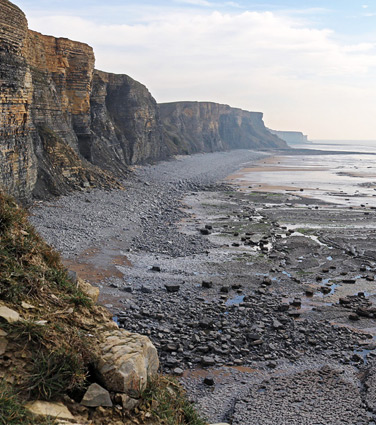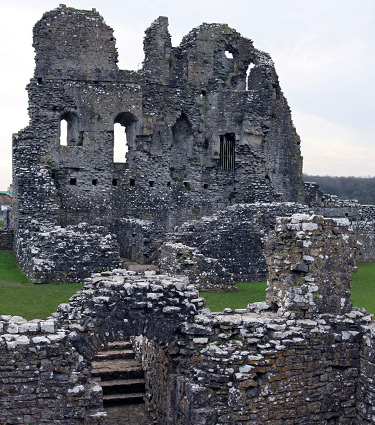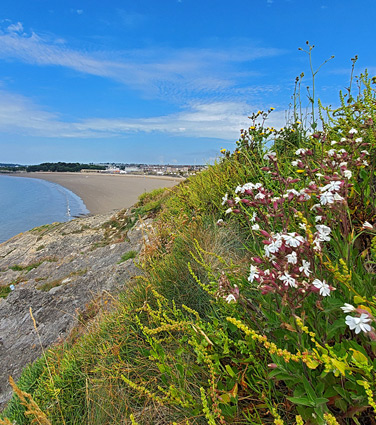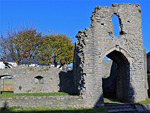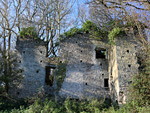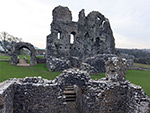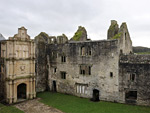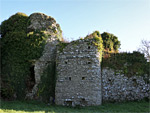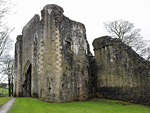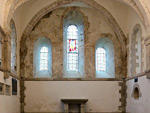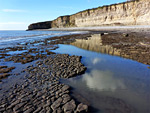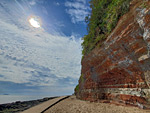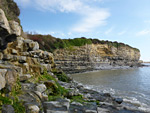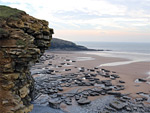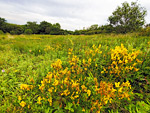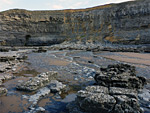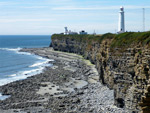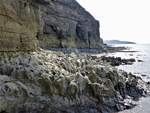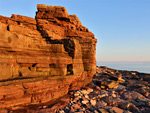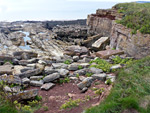Vale of Glamorgan, the southernmost county in Wales, extends from the west side of Cardiff to just east of Bridgend, and includes a scenic, 30 mile stretch of coastline, between Penarth and Ogmore-by-Sea; all the area is south of the M4. Adjacent counties, all to the north, are Bridgend, Rhondda Cynon Taf and Cardiff. Most of the land is fairly flat, or gently undulating, crossed by little rivers, which often form shallow, steep-sided valleys. There are some low ranges of hills, and patches of woodland, but all the best landscapes are along the coast.
The most visited section of the coastline is around Barry, site of a large holiday park, facing Whitmore Bay. The stretch to the east, extending to Cardiff, is also quite developed, but to the west the coast becomes steadily more rural, and more photogenic. The best section is around Southerndown, centred on Dunraven Bay, but there are plenty of lesser known locations. The coast is characterised by golden sand beaches backed by thin-layered limestone cliffs, also rich yellow/brown in colour - unlike the usual greys of other cliffs along the Bristol Channel - alternating with pebble beaches and rocky patches where the level or slightly inclined strata are eroded to form parallel or curving ridges, flat terraces and other photogenic shapes. The most spectacular part (14 miles), from Porthcawl in the west to Aberthaw in the east, is recognised as the Glamorgan Heritage Coast.
Vale of Glamorgan is noted for its unusually large number of castles or castellated mansions, for a relatively small area; also of interest are two burial chambers (St Lythans and Tinkinswood), and the monastic church of Ewenny Priory.
The most visited section of the coastline is around Barry, site of a large holiday park, facing Whitmore Bay. The stretch to the east, extending to Cardiff, is also quite developed, but to the west the coast becomes steadily more rural, and more photogenic. The best section is around Southerndown, centred on Dunraven Bay, but there are plenty of lesser known locations. The coast is characterised by golden sand beaches backed by thin-layered limestone cliffs, also rich yellow/brown in colour - unlike the usual greys of other cliffs along the Bristol Channel - alternating with pebble beaches and rocky patches where the level or slightly inclined strata are eroded to form parallel or curving ridges, flat terraces and other photogenic shapes. The most spectacular part (14 miles), from Porthcawl in the west to Aberthaw in the east, is recognised as the Glamorgan Heritage Coast.
Vale of Glamorgan is noted for its unusually large number of castles or castellated mansions, for a relatively small area; also of interest are two burial chambers (St Lythans and Tinkinswood), and the monastic church of Ewenny Priory.
Castles, including manorsBarry Castle Limited remains of a fortified mansion in a residential suburb of Barry; a hall and a two story gatehouse Rating: ★★★★★ |
Boverton Place - substantial ruins of a large country house, built in the late 16th century |
| East Orchard Castle Overgrown remains of a sizeable mansion from the 14th century, including a barn, chapel, dovecote and hall Rating: ★★★★★ |
Fonmon Castle - 12th century castle, renovated and altered in the 18th century, surrounded by gardens, and still occupied. Tours available |
| Ogmore Castle Small but pretty castle remains in a peaceful, rural location beside the River Ewenny Rating: ★★★★★ |
| Old Beaupre Castle Ruins of a large medieval mansion near the River Thaw; nearly complete, with fine carving and masonry Rating: ★★★★★ |
| Penmark Castle Partial, overgrown ruins of a 13th century castle, including walls and a two-storey tower, overlooking the River Waycock Rating: ★★★★★ |
| St Quintin's Castle Substantial, twin-towered gatehouse, curtain wall remnants and tower foundations, mostly built in the early 14th century. Also known as Llanblethian Castle Rating: ★★★★★ |
ChurchesEwenny Priory Parish church occupying part of a 12th century abbey, with a partly ruined fortified exterior Rating: ★★★★★ |
LandscapesAberthaw to Stout Bay Cliffs, terraces and pebble beaches along the easternmost three mile portion of the Glamorgan Heritage Coast Rating: ★★★★★ |
| Barry Varied section of the coast - golden sand, grey limestone terraces and red mudstone cliffs Rating: ★★★★★ |
| Barry to Aberthaw Five mile stretch of the coast; long cliffs of thin-layered limestone above terraces and pebble beaches Rating: ★★★★★ |
| Dunraven Bay to Cwm Mawr Cliffs, beaches and eroded rock formations along the Glamorgan Heritage Coast near Southerndown, plus gardens, a ruined mansion and a waterfall Rating: ★★★★★ | Lavernock Point Nature Reserve Scenic reserve overlooking limestone coastline; mainly calcareous grassland, with a good variety of wildflowers Rating: ★★★★★ |
| Nash Point to Cwm Mawr Cliffs, terraces, beaches and rock pools along a three mile stretch of the coast, plus a stream with travertine formations Rating: ★★★★★ |
| Nash Point to Stout Bay Varied, little-visited, four-mile section of the Glamorgan Heritage Coast, with layered, vertical cliffs of blue lias above extensive wave-cut terraces Rating: ★★★★★ |
| Ogmore-by-Sea Wide sandy beach giving way to sheer limestone cliffs with caves, terraces and other eroded formations Rating: ★★★★★ |
| Sully Bay to Barry Wide bay with grey pebbles and muddy terraces, bordered to the west by more photogenic red cliffs and eroded formations Rating: ★★★★★ |
| Sully Island to Lavernock Point Headland, layered cliffs, level terraces, sand and pebble beaches, and an undeveloped tidal island Rating: ★★★★★ |
